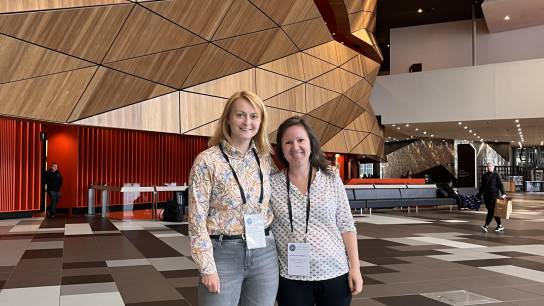
Hanna Siarova and Jekatyerina Dunajeva (PPMI)
We use cookies on our website. Cookies help make the website more user-friendly, efficient, and secure.
Please select your cookie preferences
Strictly necessary cookies are cookies required for the website to function and provide the basic information requested by the website user. These cookies are not used for tracking users.
YouTube cookies allow the playback of YouTube videos directly on our website. When YouTube cookies are used personal data or connection information, such as the IP address, may be transmitted to YouTube. By accepting YouTube cookies, you consent to the transfer of this data to YouTube. Please see our privacy policy for more information.
At the end of June, several PIONEERED partners, including Hanna Siarova and Jekatyerina Dunajeva from the Public Policy and Management Institute (PPMI), flew to Melbourne, Australia, to attend the XX ISA World Congress of Sociology. There, Hanna Siarova and Jekatyerina Dunajeva presented their research paper on "Intersectionality in Education Policy Documents: Comparative Analysis of Nine European Countries".
The paper builds on the findings generated within the framework of PIONEERED and focuses on the extent to which intersectional inequalities are recognised in education policies in select countries.
On the one hand, the paper intends to understand whether intersectional inequalities are incorporated into policy discourse when mitigating educational inequalities. On the other hand, the paper encourages policy-makers to consider intersectional approaches in the realm of education policies, as intersectionality has gained wider recognition in inequality research, yet is seldom applied in policy discourse.
The paper was presented as part of the panel "Intersectional Approach and Inequality of Educational Opportunity", co-organised by Aigul Alieva (LISER), Hanna Siarova and Jekatyerina Dunajeva, all collaborating within the PIONEERED project.
In detail, the panel session took a closer look at the fact that there is a consensus that educational disadvantages do not originate from a singular factor, but tend to result from multiple drivers (axes) of inequality. Such axes form intersections, which explain the extent of disadvantages that students may face. The intersectional approach, in other words, recognises not only multiple forms of vulnerabilities but also an interplay between those.
While intersectionality gained some recognition in empirical work, its systematic application remains relatively scarce. Similarly, it has not yet received much attention in current sociological discussions, especially focusing on educational inequalities. Meanwhile, there is a growing understanding that an intersectional lens is necessary for advancing equitable and inclusive education.
To fill this gap, the session welcomed contributions and discussions on the theoretical and practical impacts of intersectionality research in finding solutions to educational inequalities.
Overall, the conference was an opportunity to receive constructive feedback from other scholars and generate a network of researchers interested in education policy.